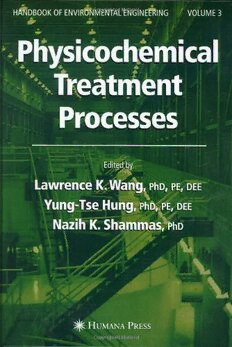
Physicochemical Treatment Processes: Volume 3 (Handbook of Environmental Engineering) PDF
731 Pages·2005·7.192 MB·English
Most books are stored in the elastic cloud where traffic is expensive. For this reason, we have a limit on daily download.
Preview Physicochemical Treatment Processes: Volume 3 (Handbook of Environmental Engineering)
Description:
A critical survey of both the principles and practices involved in water pollution control, potable water treatment, water reuse, and sludge treatment. The authors discuss the performance, potential, and limitations of each major physicochemical treatment process in detail-including the physical and chemical theory behind it, the applications, the design procedures, examples, references, and cost data-as a basis for intelligent planning and realization of treatment systems. Among the processes covered are screening, comminution, flow equalization, neutralization, mixing, coagulation, flocculation, chemical precipitation, oxidation, recarbonization, softening, halogenation, and disinfection. Additional chapters discuss ozonation, electrolysis, sedimentation, dissolved air flotation, gravity filtration, granular activated carbon adsorption, and sludge treatment. The emphasis throughout is on developing the necessary engineering from fundamental principles of chemistry, physics, and mathematics. Two companion volumes, Air Pollution Control Engineering, Volume 1, and Advanced Air and Noise Pollution Control, Volume 2, survey the basic air pollution control technique and the use of multiple techniques to deal with air, thermal, and noise pollution.
See more
The list of books you might like
Most books are stored in the elastic cloud where traffic is expensive. For this reason, we have a limit on daily download.
